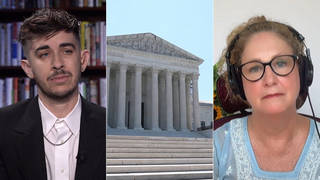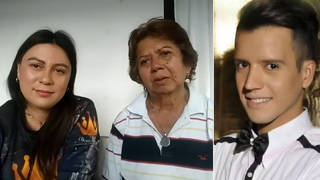
Topics
Guests
- "Sick for Profit"excerpt of the documentary by Robert Greenwald and Brave New Films.
Links
Sick for Profit, a documentary by Robert Greenwald, contrasts the salaries of insurance company CEOs with the experiences of policyholders denied medical claims. We play an excerpt. [includes rush transcript]
Transcript
JUAN GONZALEZ:
We’re going to end this show with a look, since we’ve been dealing with healthcare, at a part of Robert Greenwald’s film, Sick for Profit.
JO JOSHUA GODFREY: …up in bed at night in order to be able to breathe. I would go to CIGNA, and they would tell me I had bronchitis and just give me medicine and send me home. No matter what kind of medicine they gave me, I just didn’t get better. Then the CIGNA director called me up, and she told me that there was nothing wrong with me at all.
I got out a phone book, and I called a doctor, and I was really distraught by this time. It was 9:00 at night. And I guess he could hear the pain and the terror in my voice. And he met me there. And I came with my film and my CAT scan, and he just put it in. It took exactly thirty seconds. He told me, “You have cancer.” And he said, “The reason CIGNA didn’t want to give you your records is they’ve known, right way back for years, that you have cancer, and they wouldn’t — they’re not going to treat you.”
UNIDENTIFIED: A lot of money is made in this country off of sick people.
REP. DONNA EDWARDS: I understand why these folks are fighting healthcare reform. The CEO of CIGNA, Ed Hanway, the annual revenue, $19.1 billion, $292 million in net income. His salary, $12.2 million.
WENDELL POTTER: The reason I left CIGNA was because, toward the end of my career, I was able to see how insurance companies maximize profits by denying claims, denying care, essentially, and by dumping the sick. It’s all for the purpose of maximizing profits and enhancing shareholder value for Wall Street investors. Sometimes people will forget that they had acne at some point during the past and not disclose that. And then, later on, the insurance company can use that as a reason to cancel their insurance. Another way that insurance companies maximize their profits is by denying coverage or denying a claim.
MSNBC REPORTER: Nataline Sarkisyan had been suffering from leukemia since she was fourteen. She died yesterday at the age of seventeen.
FOX NEWS REPORTER: The family plans to sue, because the company twice denied their daughter a liver transplant.
MARK GERAGOS: CIGNA Health Corporation, literally, maliciously killed her.
HILDA SARKISYAN: We had full coverage. And guess what? CIGNA gave her zero chance to live, not even one percent. Deny, deny, deny. Why?
WENDELL POTTER: One of the things that investors and analysts look at is something called a medical-loss ratio, and this is a measure of how much of every premium dollar that you contribute is actually paid out in medical claims by the insurance company. The less a company pays out in medical claims, the more money is available for executive salaries.
JUAN GONZALEZ:
Sick for Profit, an excerpt of Robert Greenwald’s film.












Media Options